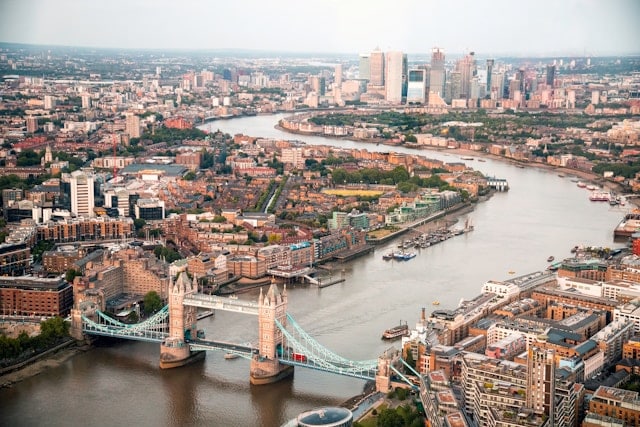In the fast-evolving world of international commerce, few relationships carry as much potential as the India-UK trade partnership. It’s not just about numbers or policies but about people, innovation, and shared ambitions. When UK Prime Minister Sir Keir Starmer recently visited India, his message was clear: the two nations are stepping into a future defined by collaboration, opportunity, and growth.
Table of Contents
Starmer’s India Visit: A Moment of Clarity in India-UK Trade
During a flight to Mumbai, Sir Keir Starmer addressed journalists alongside over 100 entrepreneurs, cultural leaders, and vice-chancellors from UK universities, as part of a mission to promote the “historic” India-UK trade agreement. He clarified that relaxing visa policies for India was not on the agenda, emphasising that no business leaders on this trip had raised concerns about visas.
“The visa situation remains unchanged with the free trade agreement; we haven’t increased the number of visas,” Starmer explained. Instead, he highlighted that the purpose of his visit is to enable Indian businesses to leverage the opportunities created by the trade deal between the two nations.
This balance between open collaboration and controlled immigration reflects how digital trade policies and real-world business interests are aligning, keeping doors open for trade while maintaining structured governance.
Building Bridges, Not Barriers: Policy Changes Impacting Business
The UK Prime Minister pointed out the substantial potential to strengthen trade and cultural ties, stating that the India-UK relationship is currently at an “all-time high.” His focus, he stressed, is on fostering business-to-business engagement, investment, and job creation in the UK, rather than altering immigration policies.
What makes this moment truly pivotal is how policy changes impacting business are shaping the next era of economic cooperation. For decades, red tape and visa restrictions have stood in the way of innovation. Now, the narrative is shifting towards policies that prioritise talent, ideas, and sustainable collaboration.
This trip offers a prime opportunity for enhancing existing connections and establishing new ones, especially with the upcoming opening of a UK campus in India.

How India-UK Trade Is Reshaping Education and Industry
While the India-UK Free Trade Agreement (FTA) has already facilitated certain measures, such as a three-year exemption on National Insurance contributions for Indian workers on short-term UK visas, and the Young Professionals Scheme (YPS), allowing citizens aged 18 to 30 to work, study, and live in each other’s countries for up to two years; UK government officials have confirmed that there are no significant changes to the overall immigration framework at this stage.
Saurabh Arora, CEO and co-founder of University Living, explained that the NI contribution exemption could benefit an estimated 60,000 IT professionals, reducing their on-site costs. Since the UK accounts for nearly 17% of India’s total IT exports, this exemption has tangible financial benefits for both companies and employees.
This aspect of the India-UK trade relationship shows how thoughtful trade policies changes can directly influence real lives, not just in boardrooms, but in classrooms and workplaces.
Recommended for You: Indian Students Are Currently Redefining Overseas Education
From the US to the UK: Competing for Global Talent
The discussions surrounding visas are also shaped by recent developments in the US, where the Trump administration’s plans to overhaul the H1B visa program, favouring highly skilled workers and implementing a controversial fee hike to $100,000, are expected to impact Indian graduates and professionals, who constitute over 73% of applicants.
Meanwhile, the UK is attempting to attract top talent by offering lower visa fees and increasing the cap on highly skilled workers, aiming to position itself as a more appealing destination for Indian professionals seeking to work abroad.
Starmer expressed his interest in bringing global talent to the UK to support economic growth. “Where there is top talent across the globe, I want to bring that talent into the United Kingdom,” he told reporters.
The message here is simple but powerful: the future of India-UK trade lies in people: their expertise, creativity, and drive.
Universities at the Heart of India-UK Trade Expansion
UK universities stand to benefit significantly from this India engagement. With 13 vice-chancellors participating in the delegation, the increased demand for higher education in India, projected to reach 70 million placements by 2035, opens new opportunities for UK institutions facing financial pressures at home and seeking international expansion.
Already, institutions like Southampton University have opened campuses in India, such as the Gurugram facility enrolling about 150 students during its first term. Several other universities including Coventry, Queen’s Belfast, Surrey, Bristol, York, Aberdeen, and Liverpool, are planning to launch campuses in major Indian cities like Mumbai, Bengaluru, and GIFT City by 2026.
The expansion of UK universities into India represents more than education. It is a symbol of how cross-border e-commerce opportunities and digital trade policies can extend into knowledge exchange, creating a global ecosystem of shared learning and innovation.

From Students to Partners: Rethinking the Education Model
Starmer clarified that the goal isn’t merely to recruit Indian students to the UK but to develop long-term partnerships that enable students to study within India, forging strong educational exchanges. “Our visit is an excellent opportunity to reinforce existing ties and establish new ones, especially with the upcoming campus openings,” said Tim Jones, Vice-Chancellor of the University of Liverpool.
Other participating universities include Birmingham, Leicester, Lancaster, Southampton, York, Bristol, Imperial College London, UCL, Aberdeen, and Surrey. This approach signifies how India-UK trade is moving from transactional exchanges to transformational partnerships, turning education into a bridge that benefits both economies.
Recommended for You: UK Transnational Education to Overtake Onshore Enrollments
Vision 2035 and Beyond: Trade Policies Changes That Matter
The India-UK educational partnership is further institutionalised through the Vision 2035 framework, which promotes annual ministerial dialogues on mutual recognition of qualifications, collaborative research, and platforms such as the UK’s Education World Forum and India’s National Education Policy initiatives.
Arora noted that this strategic alignment anticipates continued growth in academic collaborations and student exchanges, with the trade deal aiming to boost bilateral trade by £25.5 billion annually by 2040, fueling more partnerships, knowledge exchange, and mobility of students.
Such trade policy changes illustrate how diplomacy, education, and economics can intersect seamlessly. The Vision 2035 plan embodies the belief that global collaboration, when done right, isn’t just policy; it’s progress.
India as a Partner, Not a Market
Industry leaders also see India as a “partner” rather than just a recruitment market. Disha Gupta, Head of Operations for India, Nepal, UAE, and Sri Lanka at Birmingham City University, acknowledged that India has evolved beyond being solely a target market, increasingly becoming a co-creator of educational solutions.
However, she emphasised the challenges associated with the UK’s over-reliance on agent networks without adequate regional segmentation, noting that strategies effective in Punjab might not resonate in Tamil Nadu, and outreach efforts should reflect India’s diverse landscape.
Gupta concluded that universities can maintain the UK’s appeal by strengthening employability links through industry partnerships, placements, and alumni networks, which demonstrates value to prospective students. Her insights point to a broader truth: India-UK trade is no longer a one-way street. It’s about co-creation, cultural respect, and long-term collaboration.
Creative Partnerships Beyond Business: A Cultural Connection
The delegation also includes major cultural institutions like the British Film Institute and the National Theatre, signsignallingcus on expanding creative collaborations, co-productions, museum and heritage partnerships, talent exchanges, and cross-sector initiatives across film, fashion, sports, and digital culture.
This dimension of India-UK trade showcases that trade isn’t just about economics; it’s about identity. Through arts and culture, nations tell stories, build trust, and inspire mutual understanding, the foundation of every successful global partnership.

A Future Fuelled by Opportunity and Shared Ambition
The trade agreement is projected to have a substantial economic impact, boosting the UK’s GDP by an estimated £4.8 billion annually, increasing wages by £2.2 billion, and generating roughly USD 9-10 billion in export growth.
It will make UK exports like cars and whisky more affordable in India and Indian textiles and jewellery competitively priced in the UK. Prime Minister Starmer’s upcoming meeting with Indian Prime Minister Narendra Modi will include discussions on the Technology Security Initiative launched last year, aimed at deepening collaboration in AI, telecommunications, and defence technologies.
Additionally, the delegation’s visit is accompanied by practical developments in air travel, with British Airways announcing a third daily flight from Delhi to Heathrow starting next year, and Manchester Airport revealing plans for a new direct route to Delhi, facilitating stronger connectivity between the two countries. All these shifts are living proof that India-UK trade isn’t a distant dream. It’s a tangible transformation already in motion.
Recommended for You: UK International Student Policy: Wales Rejects the UK’s Plan for Student Levy
The Human Side of Trade: Why This Matters
Starmer summarised the significance of this trip and the broader partnership, stating, “It’s not just a piece of paper; it’s a launchpad for growth. With India projected to be the third-largest economy in the world by 2028, and trade becoming quicker and cheaper, the opportunities before us are unparalleled.”
In the end, the essence of India-UK trade lies not in treaties but in trust. Behind every trade deal are people, students chasing education, professionals seeking growth, entrepreneurs building bridges, and policymakers shaping futures. This partnership isn’t about the exchange of goods; it’s about the exchange of possibilities.
The journey of India-UK trade is only beginning, but it’s already redefining what collaboration looks like in the modern world. From digital trade policies to education, from business engagement to cultural partnerships, this relationship embodies balance: the perfect blend of ambition and action.
In a world that often talks about borders, this partnership reminds us of bridges: bridges built through shared values, mutual respect, and a common vision for progress.

